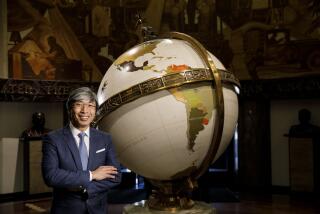Jack Fuller dies at 69; Pulitzer Prize-winning editorial writer and former Tribune Co. executive
Jack Fuller, journalist, novelist and former president of Tribune Co.’s publishing division who shepherded the Chicago company’s 2000 acquisition of the Los Angeles Times’ parent, the Times Mirror Co., has died.
Fuller died Tuesday in his Chicago home. He was diagnosed several months ago with cancer. He was 69.
A Pulitzer Prize-winning editorial writer, Fuller also was a war correspondent, a champion of jazz and an early advocate of online journalism. “Jack was one of the most brilliant writers, editors and newsroom leaders I’ve known,” said Bruce Dold, editor and publisher of the Chicago Tribune. “He had a profound impact on me and many other people at the Tribune. He taught us to be aggressive, fearless and ethical.”
Born in Chicago, Fuller followed his financial reporter father into the newsroom. He worked as a copy boy and later earned a bachelor’s degree in journalism from Northwestern University in 1968.
From there, he headed to Yale Law School but was drafted into the Army, serving as a Vietnam correspondent for Pacific Stars and Stripes in 1969 and 1970. He spent the summer of 1972 writing for the Washington Post.
After earning his law degree from Yale in 1973, Fuller returned to Chicago to resume his journalism career. But after two years as a general assignment reporter at the Chicago Tribune, he left the paper to join the U.S. Department of Justice as special assistant to then-Atty. Gen. Edward Levi. He rejoined the Tribune as a Washington correspondent in 1977 and returned to Tribune Tower in Chicago in 1978 as an editorial writer.
Appointed editorial page editor in 1981, he won a Pulitzer Prize five years later for editorials on constitutional law. He was named executive editor, second-in-command of the newsroom, in 1987 and promoted two years later to vice president and editor.
Colleagues recalled Fuller as soft-spoken, with an intellectual demeanor and professorial style. For many years, he sported a beard and wore a beret. When he started wearing glasses, he perched them on the bridge of his nose. He even occasionally smoked a pipe.
A trombone player, pianist and jazz aficionado, Fuller believed it was crucial for the Tribune — located in a city that’s a hub for jazz — to have someone dedicated to covering that music and the culture surrounding it, said Howard Reich, Tribune’s jazz critic, a musician appointed to his post by Fuller.
When Fuller joined the Pulitzer board in 1992, he launched a personal crusade to redefine the rules of the music category — long dominated by classical compositions, Reich said.
Jazz entries trickled in as the board made it clear that a musical entry could include improvisational elements. In 1997, trumpet virtuoso Wynton Marsalis became the first musician to win the prize for a jazz composition — after the board had put Reich and other jazz experts on the jury.
“Jazz is America’s classical music, and he wanted the world to know that,” Reich said.
Even after rising in management ranks, Fuller still wrote the occasional jazz review. Of jazz musician John Coltrane, he wrote:
“By the time of this death, I think Coltrane himself must have realized he had reached a place he did not know how to get out of. There was nothing left to strip out of his music, nothing forbidden that he could try, no freedom left. Only the universal rumble and buzz, which is random, which is utterly liberated, which is noise.”
In 1993, Fuller was named president and CEO of the Chicago Tribune and became publisher a year later. With Fuller’s support, the Tribune was one of the first newspapers to enter the digital age — making Internet access available in the newsroom and launching one of the first online editions, said Howard Tyner, Fuller’s successor as editor.
“Chicago Tribune was recognized and criticized in many quarters for being the first major paper to take the Internet and multimedia seriously,” Tyner said. “It was a rational futuristic approach to journalism, and Jack easily could have tamped that down, as I think senior folks at other newspaper companies were doing.”
In 1997, Fuller rose to lead the company’s five daily newspapers and syndicated content.
Column: Jack Fuller — mentor, newspaperman, hero »
Former top editor Ann Marie Lipinski, who now runs the Nieman Foundation for Journalism at Harvard, said Fuller’s journalistic integrity made him a master translator for his corporate colleagues in the boardroom who might not understand how a newsroom operates. She said it made people want to work for him.
“There was this fundamental trust,” Lipinski said. “To have his hand at your back and to know that he had faith in you, but also to know you had these shared values about what a newspaper was there to do, was the most inspiring and exhilarating feeling I’ve ever had as a journalist.”
Fuller’s tenure at the Tribune was a high-water mark for women in the company and the industry, Lipinski said. In addition to promoting female editors in the newsroom, Fuller later appointed female publishers at four of the chain’s papers.
He insisted it had nothing to do with political correctness or a quest for equality.
“You want the best people,” he once said. “That means you don’t take from 50% of the talent pool.”
Fuller played a central role in Tribune’s acquisition of Times Mirror Co., with its 10 newspapers and their websites, including the Los Angeles Times.
“Being bigger and having a bigger footprint makes us more able to control our fate,” he said at the time.
But shortly after the Times Mirror acquisition, the media industry encountered one of its worst advertising recessions. Online pressure also grew more intense.
In the months preceding Fuller’s retirement, the company had to compensate advertisers for inflated circulation figures at Newsday and the New York edition of Hoy, the company’s Spanish-language newspaper.
Fuller insisted that his departure had long been planned and had nothing to do with the circulation scandal; he simply missed writing.
He continued to write opinion pieces for the Tribune. He also wrote novels and other books. His eighth novel, “One From Without,” came out this month.
A Times reviewer called his 2000 novel “The Best of Jackson Payne” (Alfred A. Knopf) “one of the few novels about jazz to recognize that language may never capture the magic of music but may just evoke the hell out of it.”
Fuller is a past president of the Inter American Press Assn., which works to monitor and safeguard freedom of expression in the Western Hemisphere. He also served on the board of the John D. and Catherine T. MacArthur Foundation and was a trustee of the University of Chicago.
Fuller emphasized commitment to journalism throughout his career.
Addressing Los Angeles Times journalists in the wake of the acquisition, he said: “I can promise you that there will be change. What I can also promise you is that there will be no abandonment of principle or the purposes that I think we all share.”
He held that newspapers should take a lead role in community affairs in their respective markets and be involved in local philanthropy efforts.
“Newspapers grow out of the soil of the community,” he wrote in his book “News Values: Ideas for an Information Age,” published in 1996. Whether in print or online, the newspaper needs “to have a distinctive voice that relates well to the community it serves.”
He is survived by his wife, Debra Moskovits, and two children from a previous marriage, son Timothy and daughter Katherine Ryan.
Brachear Pashman writes for the Chicago Tribune. A Times staff writer contributed to this report.
ALSO
Wayne Jackson of the Memphis Horns duo dies at 74
Anton Yelchin, actor in ‘Star Trek’ films, dies in freak car accident at age 27
Verna B. Dauterive dies at 93; longtime L.A. Unified principal and honorary USC trustee
More to Read
Start your day right
Sign up for Essential California for the L.A. Times biggest news, features and recommendations in your inbox six days a week.
You may occasionally receive promotional content from the Los Angeles Times.






